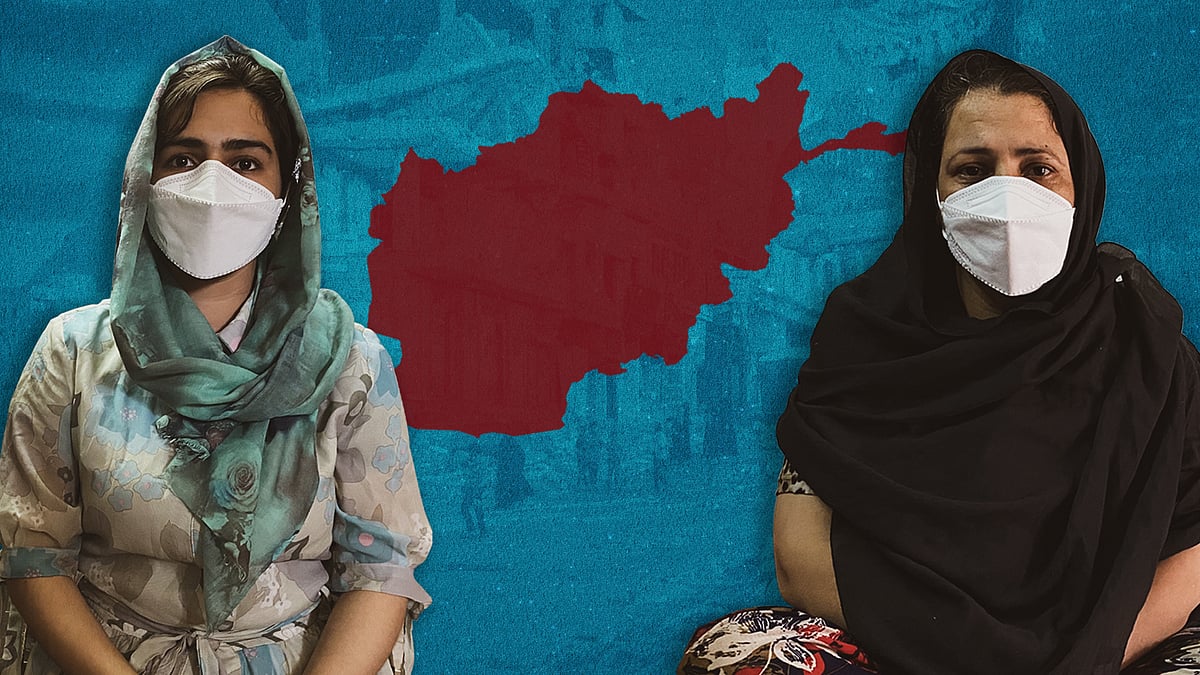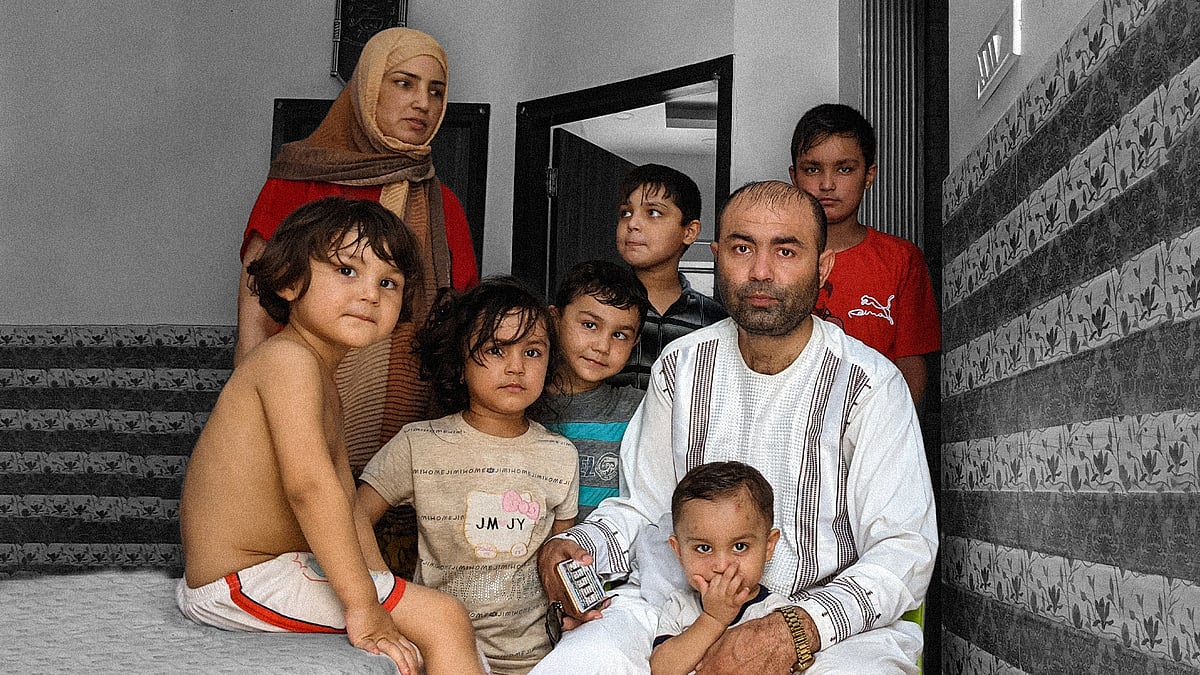Living in limbo: For Afghans in India, staying on is a challenge
Newslaundry spoke to three Afghans who have been in India since the Taliban seized power in Afghanistan.
Three months after the Taliban assumed power in Afghanistan, the country remains in a state of turmoil. For Afghans living outside the country, there is uncertainty about whether they can return to their homeland. The Afghan diaspora in India is approximately 21,000 strong and according to the United Nations High Commissioner for Refugees (UNHCR), 11,000 Afghans are registered as asylum seekers in India. The rest live in a state of limbo, walking a tightrope of visa extensions and depleted savings. Newslaundry spoke to three Afghans who have been in India for the past few months, and whose lives have been changed in unexpected ways since the Taliban seized control of Afghanistan.
Ghazala doesn’t want to go home
When it was developed in the newly-independent India, Lajpat Nagar was home to mostly Hindus and Sikhs who had come from Pakistan after the partition of 1947. Today, it’s become home to a community of Afghan refugees. Ghazala Mohammad, 27, has been living in her one-bedroom apartment in Lajpat Nagar since December 2020, when she came to India seeking medical treatment.

Ghazala in her one-bedroom house.
Mohammad is from Kabul, the capital of Afghanistan. She used to work as a receptionist at Zack International Group Companies, an Afghan-American company. When doctors in Afghanistan suggested she go to India to treat injuries she sustained from a fall, Mohammad got a three-month visa, took leave from work, and arrived in India on December 14, 2020. She left behind in Afghanistan her mother and four siblings.
Doctors at Delhi’s Amarleela Hospital have been able to help Mohammad, whose treatment is ongoing, and so far, she’s got one visa extension on medical grounds. She’s applied for another extension because Mohammad is determined to not return to Afghanistan.
With the Taliban in power, Afghan women are no longer free to work as they were before and in end-August, Mohammad was informed that she would no longer have a job. She’s familiar with the dangers of going against the Taliban’s ideology. “My father used to work with the government and when a few of our distant relatives joined the Taliban, they started to threaten us. They would come to our house and threaten to kill us or throw pamphlets into our compound with death threats,” she said. The threats only reduced when Mohammad’s father moved to Germany in June 2020. Her mother and two sisters fled to Albania last month. Now, only Mohammad’s eldest sister remains in Kabul. On November 7, she was in their car with her husband who was driving and had the car radio on at a low volume. “They were driving in the city. The Taliban stopped them, shoved the butt of their rifle inside the car window and beat up my brother-in-law,” Mohammad said, showing a photo of the injuries sustained by her brother-in-law.

Ghazala shows a photo of her brother-in-law who was beaten up by the Taliban.
Mohammad knows she doesn’t want to return to Afghanistan, but she’s worried about running out of money and not being able to afford the Rs. 5000 she pays as rent as well as her medical treatment. In addition to her physical ailments, Mohammad is also worried about her mental health. “I wake up, I sit in this room and I go mad. But I would much rather go mad than go to Afghanistan. You can put me in a mental asylum here, but I won’t go to Afghanistan”, she said.
Zabiullah Zabi goes home
When this reporter called Zabiullah Zabi, 37, on November 10, 2021, he picked up the phone quickly. “I’m back in Afghanistan,” he said. Three months ago, Zabi and his wife were living in New Delhi and seemed hopeful of building a life in India. “I have four sons and two daughters. My children should not grow up in a country where they can't sing, dance or love freely,” he had told Newslaundry.
Zabi worked at the Indian consulate in Afghanistan and on August 13, two days before Kabul fell into the hands of the Taliban, he fled to India with his wife and six children. They found a small two-bedroom house in Lajpat Nagar. “I hope the Indian government can keep us here as refugees,” he had said in August. “I have worked with the Indian government for 20 years and hopefully they will do something. If they don’t, we would be forced to go back.”
That optimism turned to bitterness over the next few months. “There was no point in staying. I couldn’t get a job. We were being forced to pay double the [regular] rent. How would I have managed my life?” he said. It’s been about a month since Zabi and his family returned to Afghanistan. They’re now living in Mazar-e-Sharif. “Being in Afghanistan is better I guess. The Taliban also seem better than last time. At least here my wife and children can speak a language they understand,” he said.
Taiyaba Zia wants to go home
When Taiyaba Zia, 29, came to India in August this year, she was eight months pregnant and accompanying her mother and son, both of whom needed medical attention. Zia’s 58-year-old mother had been diagnosed with a heart problem and her son, who is six years old, is unable to walk or speak. Doctors in Kabul had recommended Zia take both her mother and son to India for treatment.

Taiyaba's and Ubaidullah's sons.
Three months later, the Zias have run out of money and are desperate to return to Afghanistan. When asked if she feels scared of living under Taliban rule, Zia said “What are we to do even if we’re scared? Whatever fate awaits us, we will wait for it at home.”
Zia lived in Mazar-e-Sharif with her husband Ubaidullah, 29, who worked as a labourer. Weeks before they left for India, Ubaidullah’s mother died of Covid and it convinced the family to put their life savings into seeking medical help for Zia’s son and mother. Initially, the plan was to stay for 12 days but after the Taliban took control of Kabul on August 15, 2021, the Zias realised they would be forced to extend their stay.
Three months later, there is a new addition to the family — Zia gave birth to a daughter on August 30 — but for the Zias, alongside the joy of becoming parents again is the despair of living in limbo. “We want to go back to our country. There’s no point staying here,” said Ubaidullah.
The trip to India has not been fruitful for the Zias. Doctors in India were unable to help Zia’s paralysed son and diagnosed Zia’s mother with ovarian cancer. “Doctors said she needs an operation, but we don’t have any money left. Now we just want to go home,” said Zia. The family of six live in a two-bedroom apartment in Lajpat Nagar. The rent is Rs 450 a day, which has been a challenge for Ubaidullah. In October, the landlord asked them to vacate the house. “Where will I go with my three babies, my wife and sick mother? And I can’t even seem to get a job here,” said Ubaidullah. Fortunately for the family, the Afghan community in Lajpat Nagar pitched in and helped the Zias financially.

'Where will I go with my three babies, wife and sick mother,' asks Ubaidullah.
Returning to Afghanistan is a complicated process for the Zias. “We can’t go by flight because it’s too expensive for us. We will go by road via Pakistan but just need our papers to be approved,” said Ubaidullah. The Zias have submitted all the paperwork that they have to the Afghan embassy in Delhi in the hope of being able to return. “One day she goes to the Pakistan embassy and the next to the Afghanistan embassy,” Ubaidullah said of Zia’s cancer patient mother.
All pictures by Nidhi Suresh.
 ‘I am dying everyday now’: Ethnic Afghan refugees in India struggle to access education, livelihoods
‘I am dying everyday now’: Ethnic Afghan refugees in India struggle to access education, livelihoods
 ‘My kids shouldn’t grow up where they can't sing, dance, love freely’: Afghan consulate worker who fled
‘My kids shouldn’t grow up where they can't sing, dance, love freely’: Afghan consulate worker who fledNL Digest
A weekly guide to the best of our stories from our editors and reporters. Note: Skip if you're a subscriber. All subscribers get a weekly, subscriber-only newsletter by default.
